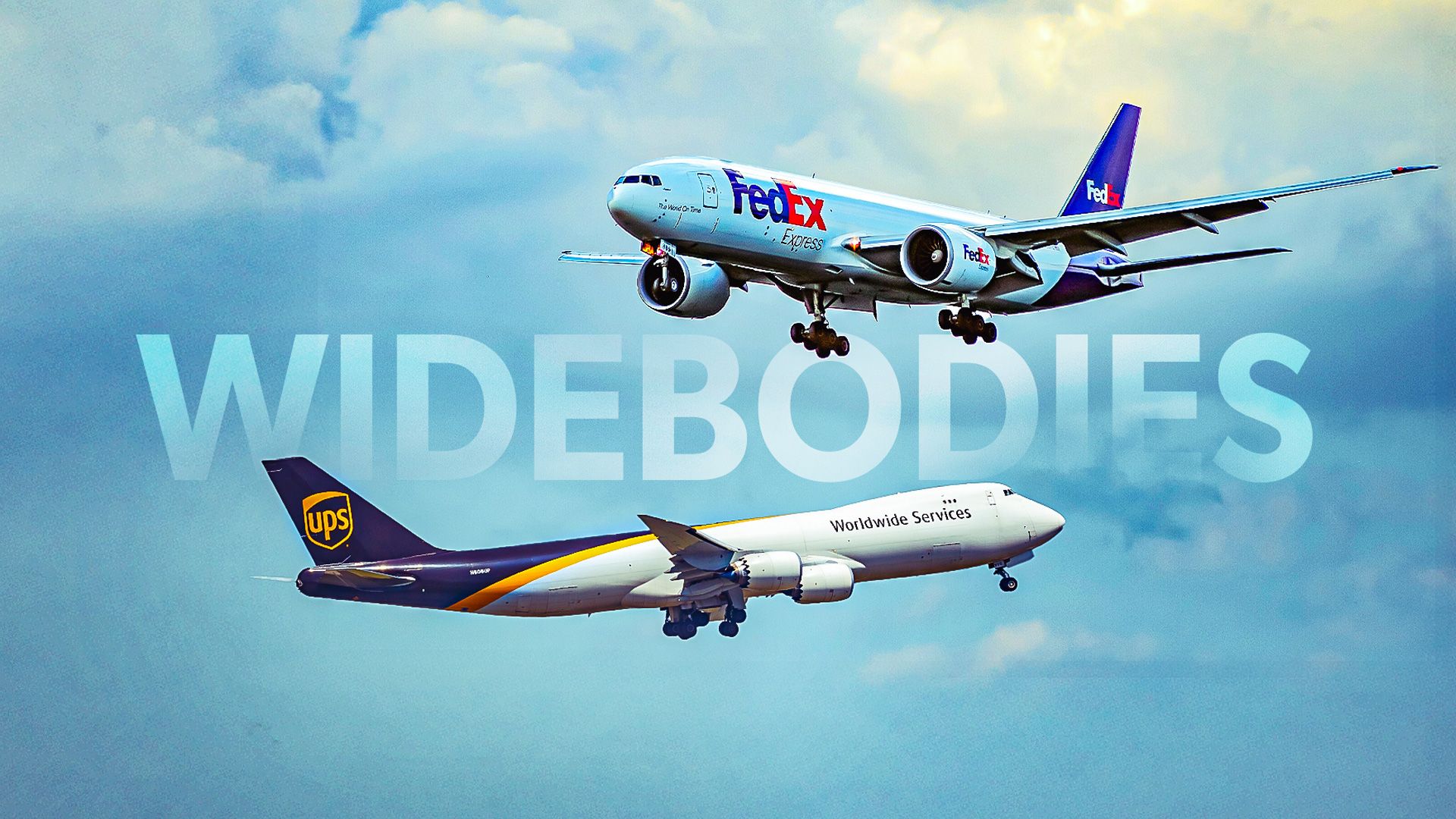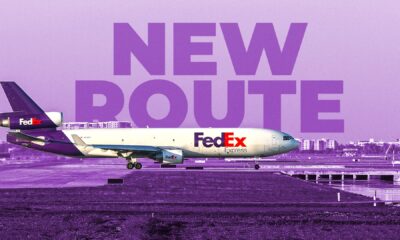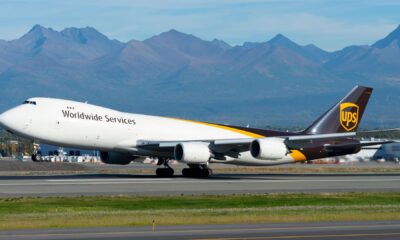World
FedEx and UPS Battle for Dominance in Widebody Fleet Size

Competition between FedEx Express and UPS Airlines continues to shape the global air cargo market, particularly in their operations of widebody aircraft. Both companies are major players in this sector, each boasting substantial fleets that are crucial for the transportation of goods worldwide. As both FedEx and UPS ramp up their efforts to modernize their fleets, a closer examination reveals which carrier currently operates the largest number of widebody aircraft.
Overview of FedEx Express
FedEx Express stands as the largest cargo airline globally by fleet size and plays a pivotal role in facilitating swift, reliable commerce. Operating nearly 400 aircraft, FedEx connects over 375 airports across more than 220 countries. Founded in 1971 by Frederick W. Smith, the company pioneered the overnight delivery concept, utilizing a hub-and-spoke system that remains efficient today. Its primary hub is located at Memphis International Airport (MEM), with major regional facilities in Indianapolis, Paris, and Guangzhou.
The airline’s workforce, which includes pilots, maintenance teams, and logistics experts, is critical for ensuring operational safety and efficiency. As part of its commitment to sustainability, FedEx aims for carbon-neutral operations by 2040, investing in Sustainable Aviation Fuel (SAF) and enhancing its ground operations.
FedEx’s Widebody Fleet
Among its fleet, FedEx operates 295 widebody aircraft, positioning it among the largest freighter fleets worldwide. Key models include the Boeing 777F, Boeing 767-300F, Airbus A300-600RF, and the McDonnell Douglas MD-11F, which is gradually being phased out. The Boeing 777F, with a payload capacity of approximately 233,000 lbs, excels on long-haul routes, while the 767-300F serves as a versatile option for medium-range legs.
FedEx’s widebody fleet composition is as follows:
– Airbus A300-600RF: 64
– Boeing 767-300F: 146
– Boeing 777F: 59
– McDonnell Douglas MD-11F: 26
– **Total**: 295
In addition to its widebody fleet, FedEx operates 87 Boeing 757-200SFs, making it the world’s largest operator of this converted aircraft type.
UPS Airlines Overview
UPS Airlines, the air division of United Parcel Service (UPS), also plays a vital role in the air cargo landscape. Headquartered in Louisville, Kentucky, UPS Airlines operates a fleet of over 290 aircraft, delivering packages across more than 300 global destinations. Established in 1988 to meet the rising demand for expedited delivery, UPS Airlines has grown into a key player in logistics and e-commerce.
The carrier’s central hub, known as Worldport at Louisville Muhammad Ali International Airport (SDF), handles over 400,000 packages per hour. UPS Airlines also maintains several regional hubs, including those at Miami International Airport (MIA), Cologne Bonn Airport (CGN), and Shanghai Pudong International Airport (PVG). Like FedEx, UPS is committed to sustainability and aims for carbon neutrality by 2050.
UPS Airlines’ Widebody Fleet
UPS Airlines operates a widebody fleet of 219 aircraft, which are essential for long-haul international and high-demand domestic routes. The fleet includes the Boeing 747-8F, known for its high capacity and fuel efficiency, with nearly 30 units in operation. The Boeing 767-300F also remains a critical component, with recent orders for additional aircraft to expand and modernize the fleet.
This is the breakdown of UPS’s widebody fleet:
– Airbus A300-600RF: 52
– Boeing 747-400F: 11
– Boeing 747-400BCF: 2
– Boeing 747-8F: 30
– Boeing 767-300F: 97
– McDonnell Douglas MD-11F: 27
– **Total**: 219
Both carriers also utilize converted Boeing 757-200PFs for their narrowbody fleets, which provide crucial support for medium-haul routes.
Future Developments in Widebody Deliveries
Looking ahead, both FedEx Express and UPS Airlines plan to bolster their widebody fleets. Recent orders from Boeing reflect their commitment to modernize operations and enhance capacity to meet increasing shipping demands, particularly driven by the e-commerce surge. Expected deliveries include:
– FedEx Express: 5 Boeing 767-300Fs and 8 Boeing 777Fs
– UPS Airlines: 20 Boeing 767-300Fs
This influx of new aircraft aligns with a broader industry trend toward more efficient and sustainable operations.
The Air Cargo Industry Landscape
The global air cargo industry is integral to international trade, transporting high-value goods swiftly across borders. Although air freight constitutes a small percentage of total cargo volume by weight, it represents a significant share of global trade value, often involving electronics, pharmaceuticals, and perishables.
Major players include FedEx Express, UPS Airlines, DHL Aviation, and various traditional airlines that offer dedicated cargo services or utilize passenger aircraft for cargo transport, such as Qatar Airways Cargo and Emirates SkyCargo. The industry has experienced shifts due to recent global events, including the COVID-19 pandemic, which initially disrupted operations but ultimately increased demand for air freight, particularly in e-commerce.
As both FedEx and UPS continue to expand and modernize their fleets, their competition will remain a significant aspect of the evolving air cargo sector, influencing efficiency, sustainability, and global logistics dynamics.
-

 World3 months ago
World3 months agoScientists Unearth Ancient Antarctic Ice to Unlock Climate Secrets
-

 Entertainment3 months ago
Entertainment3 months agoTrump and McCormick to Announce $70 Billion Energy Investments
-

 Lifestyle3 months ago
Lifestyle3 months agoTransLink Launches Food Truck Program to Boost Revenue in Vancouver
-

 Science3 months ago
Science3 months agoFour Astronauts Return to Earth After International Space Station Mission
-

 Technology2 months ago
Technology2 months agoApple Notes Enhances Functionality with Markdown Support in macOS 26
-

 Top Stories2 weeks ago
Top Stories2 weeks agoUrgent Update: Fatal Crash on Highway 99 Claims Life of Pitt Meadows Man
-

 Sports3 months ago
Sports3 months agoSearch Underway for Missing Hunter Amid Hokkaido Bear Emergency
-

 Politics3 months ago
Politics3 months agoUkrainian Tennis Star Elina Svitolina Faces Death Threats Online
-

 Technology3 months ago
Technology3 months agoFrosthaven Launches Early Access on July 31, 2025
-

 Politics3 months ago
Politics3 months agoCarney Engages First Nations Leaders at Development Law Summit
-

 Entertainment3 months ago
Entertainment3 months agoCalgary Theatre Troupe Revives Magic at Winnipeg Fringe Festival
-

 Politics2 weeks ago
Politics2 weeks agoShutdown Reflects Democratic Struggles Amid Economic Concerns





















